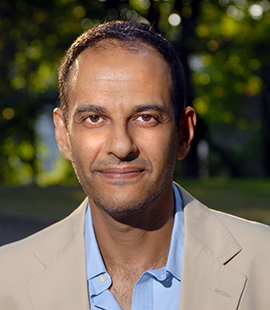In the hopes of facilitating a dialogue about Israel and Palestine after the events of this past summer, Moustafa Bayoumi, an author and English professor at Brooklyn College, City University of New York, gave his perspective.
On October 2, Bayoumi delivered a lecture titled “After Gaza: What are the Prospects for Peace and Justice in Israel and Palestine?” The talk was sponsored by the Program in Middle Eastern and Islamic Studies. Bayoumi focused on the war in the Gaza Strip this past summer, the aftermath, and the possibilities for peace in the greater region.
Bayoumi explained what he sees as the flaws with the current negotiations. Specifically, he asserted that the politically motivated conversations neglect discussions of human rights.
“We must break the script of thinking that convinces us that bombing from the air solves almost everything,” he said. “The current siege diminishes the human capacity of Gaza and ultimately the humanity of the Palestinians who live there.”
Having visited Israel, the Gaza Strip, and the West Bank multiple times, Bayoumi emphasized that many voices are left out of the conversation on both sides, and are not portrayed in mainstream American media.
“As it currently stands, the vocal political machinery bans the cause of justice and the future of coexistence,” he said. “If we had a conversation that was based on the people on the ground and on the goodwill of people internationally, we could have a much different conversation.”
Bayoumi also stressed that “people are responsible for their actions,” regardless of their affiliation.
He argued for the need to reset the terms of the dialogue at an institutional level and to find “solutions that guarantee individual and communal rights to all and find justice for all Israelis and Palestinians, including those Palestinians who are the ancestors of those displaced in 1948.”
Bayoumi authored How Does It Feel to be a Problem: Being Young and Arab in America, which won both an American Book Award and the Arab-American Book Award for Non-Fiction. His writing has appeared in a range of major news sources, including the New York Times Magazine, the Guardian, the Nation, and the Chronicle of Higher Education. He has also been featured on media outlets worldwide, including NPR, CNN, and Fox News.
Several students had the opportunity to continue the conversation with Bayoumi during lunch the next day.
“While I didn’t agree with everything Bayoumi said, I think he really helped clarify some points about Israel and Palestine,” said Ashley Brekke ’16. “I like the idea of looking at the matter as a whole by examining politics, as well as culture, history, and religion.”
“The fact that there’s a population [at Colgate] listening and that there’s concern is valuable,” noted Bayoumi. Highlighting the rise in national interest, he added that college students have the potential to positively change the discourse, but that it can be “a campus-wide struggle.”
Colgate’s dialogue about this major international issue will continue on Saturday, October 25, when former Israeli prime minister and president Shimon Peres delivers the next lecture in the Kerschner Family Series Global Leaders at Colgate. For ticket information, visit colgate.edu/globalleaders.
